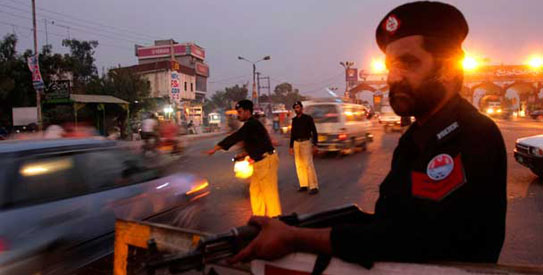
ISLAMABAD: Pakistani police have been named as the most frequent recipients of bribes in the 2010 Global Corruption Barometer of the Transparency International published on Thursday.
The Transparency International picked up 11 institutions and services, from health to education to tax authorities, for this year’s global barometer which is based on a worldwide public opinion survey on corruption.
The weighted figure for police was 4.5. (1 is for not at all corrupt and 5 for extremely corrupt).
The second largest recipients of bribery in Pakistan are civil servants (4.2), followed by political parties (4.1), parliament/legislature (4.0), business and private sector (3.8), NGOs (3.8), judiciary (3.6), media (3.3), education system (3.1), military (3.0) and religious bodies (2.8).
At the global level, the lists are topped by political parties, with non-governmental organisations and the military featuring at the bottom.
Nonetheless, religious bodies and political parties have registered the biggest increase in perceived corruption over time.
Perceptions about NGOs and the private sector have also deteriorated. But public opinion about judiciary has improved; those viewing it as corrupt or extremely corrupt decreased by 10 percentage points.
According to the barometer, 73 per cent of the population surveyed assessed that the Pakistani government had been ineffective in fighting corruption, while 77 per cent were of the view that the level of corruption in the country had increased over the past three years.
Corruption has increased over the last three years, say six of 10 people around the world, and one in four people report paying bribes in the last year.
The findings were released to mark the International Anti-Corruption Day by Transparency International on Thursday.
Views on corruption trends are most negative in Europe and North America, where 73 per cent and 67 per cent, respectively, think corruption has increased over the past three years.
Despite these results, the survey also found that seven out of 10 people would be willing to report an incident of corruption.
The Global Corruption Barometer surveyed more than 91,000 people in 86 countries and territories. It focussed on petty bribery, perceptions of public institutions and views of whom people trust to combat corruption.
The survey showed that over the past 12 months one in four people paid a bribe to one of nine institutions and services, from health to education to tax authorities.
Police have been named the most frequent recipient of bribes, according to those surveyed, with 29 per cent of those who had contact with the police reporting that they paid a bribe.
Sub-Saharan Africans report paying the most bribes: more than one in two people report paying a bribe in the past 12 months.
This compares to 36 per cent of people surveyed in the Middle East and North Africa, 32 per cent in the newly independent states, 23 per cent in Latin America, 19 per cent in the Western Balkans and Turkey, 11 per cent in Asia Pacific and just five per cent in European Union countries and North America.
More than 20 countries report significantly more petty bribery than in 2006, when the same question was asked in the Barometer.
The biggest number of reported bribery payments in 2010 is in Afghanistan, Cambodia, Cameroon, India, Iraq, Liberia, Nigeria, Palestine, Senegal, Sierra Leone and Uganda where more than 50 per cent of people surveyed paid a bribe in the past 12 months.
The demographics of bribery continue to disadvantage the poor and the young. As in past surveys, lower income earners report paying more bribes than higher income earners.
Poorer people are twice as likely to pay bribes for basic services, such as utilities, medical services and education, than wealthier people.
“Corruption is a regressive tax. This injustice must be addressed. The marginalised and poor remain the most vulnerable to extortion. Governments should do more to identify corruption risks in basic services and to protect their citizens,” said Huguette Labelle, Chair of the Transparency International.
A few people trust their governments or politicians. Eight out of 10 say political parties are corrupt or extremely corrupt. The civil service and parliament are considered the next most corrupt institutions.
“The message from the 2010 Barometer is that corruption is insidious. It makes people lose faith. The good news is that people are ready to act,” Ms Labelle said.











































Dear visitor, the comments section is undergoing an overhaul and will return soon.